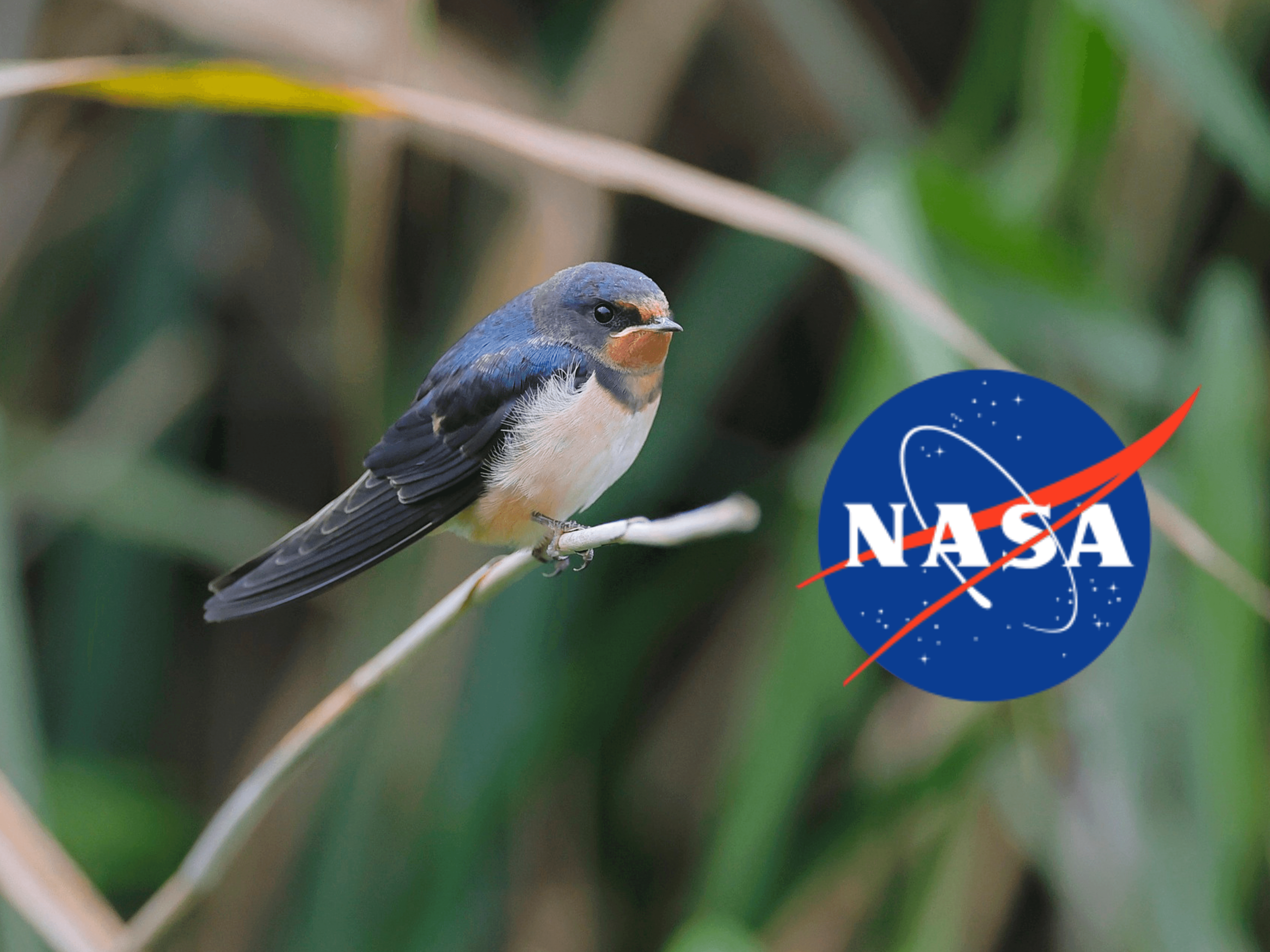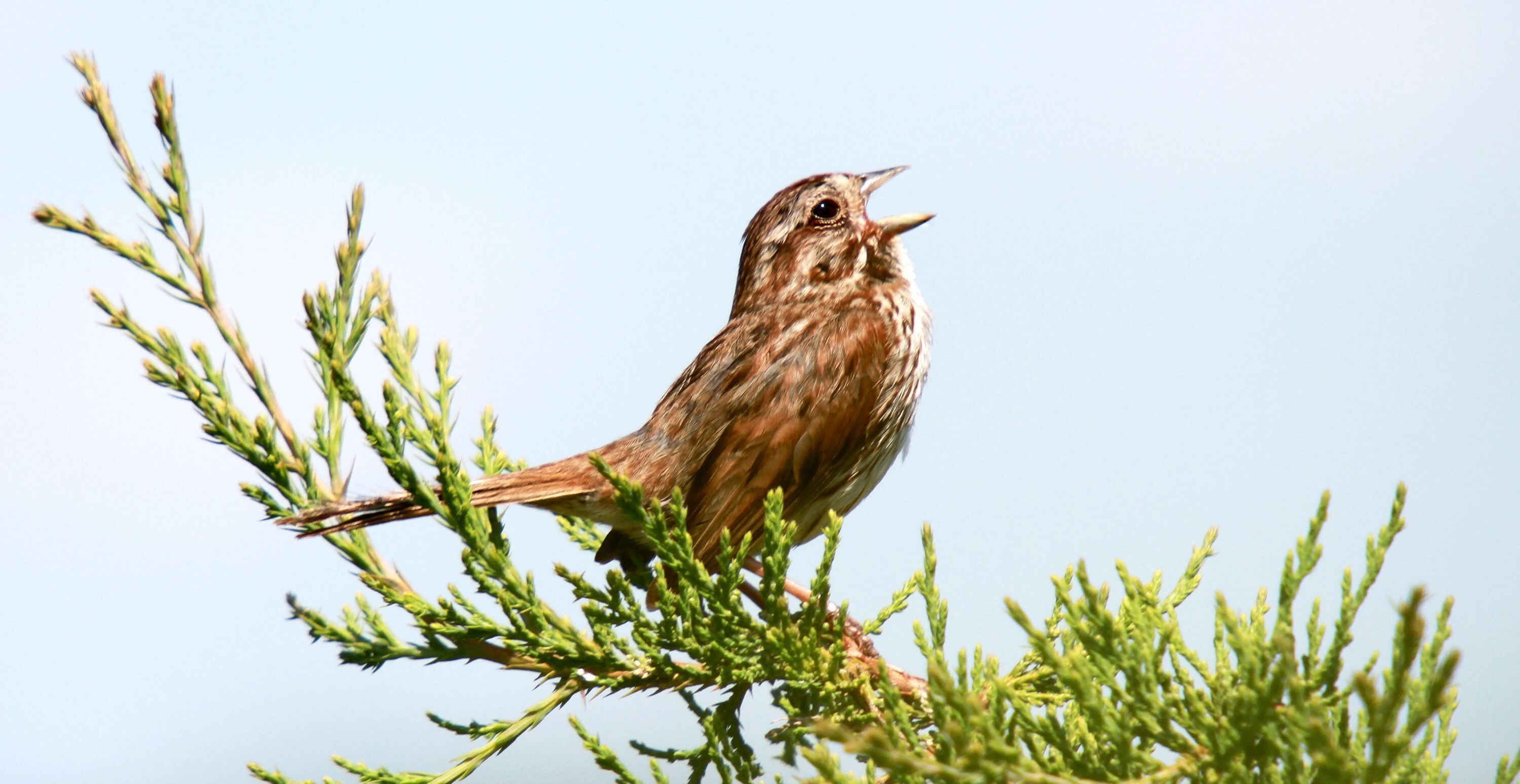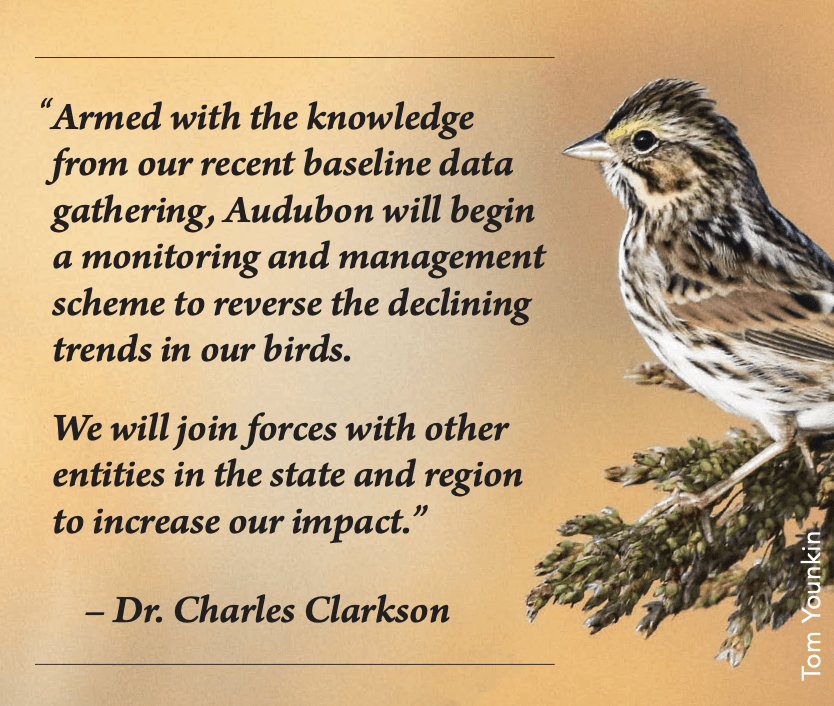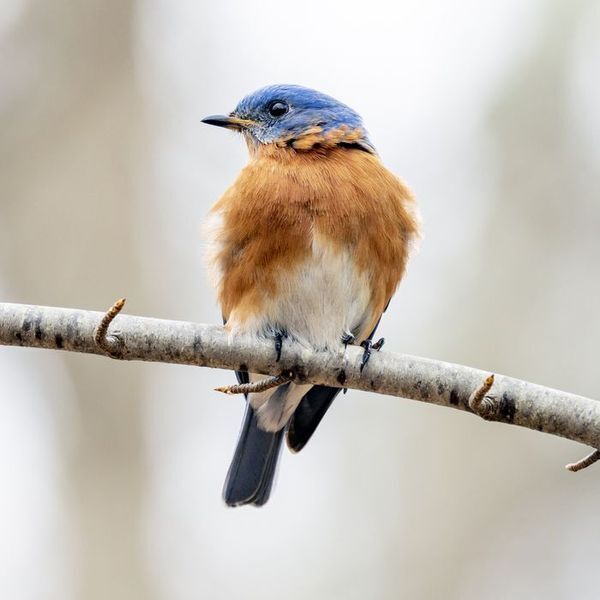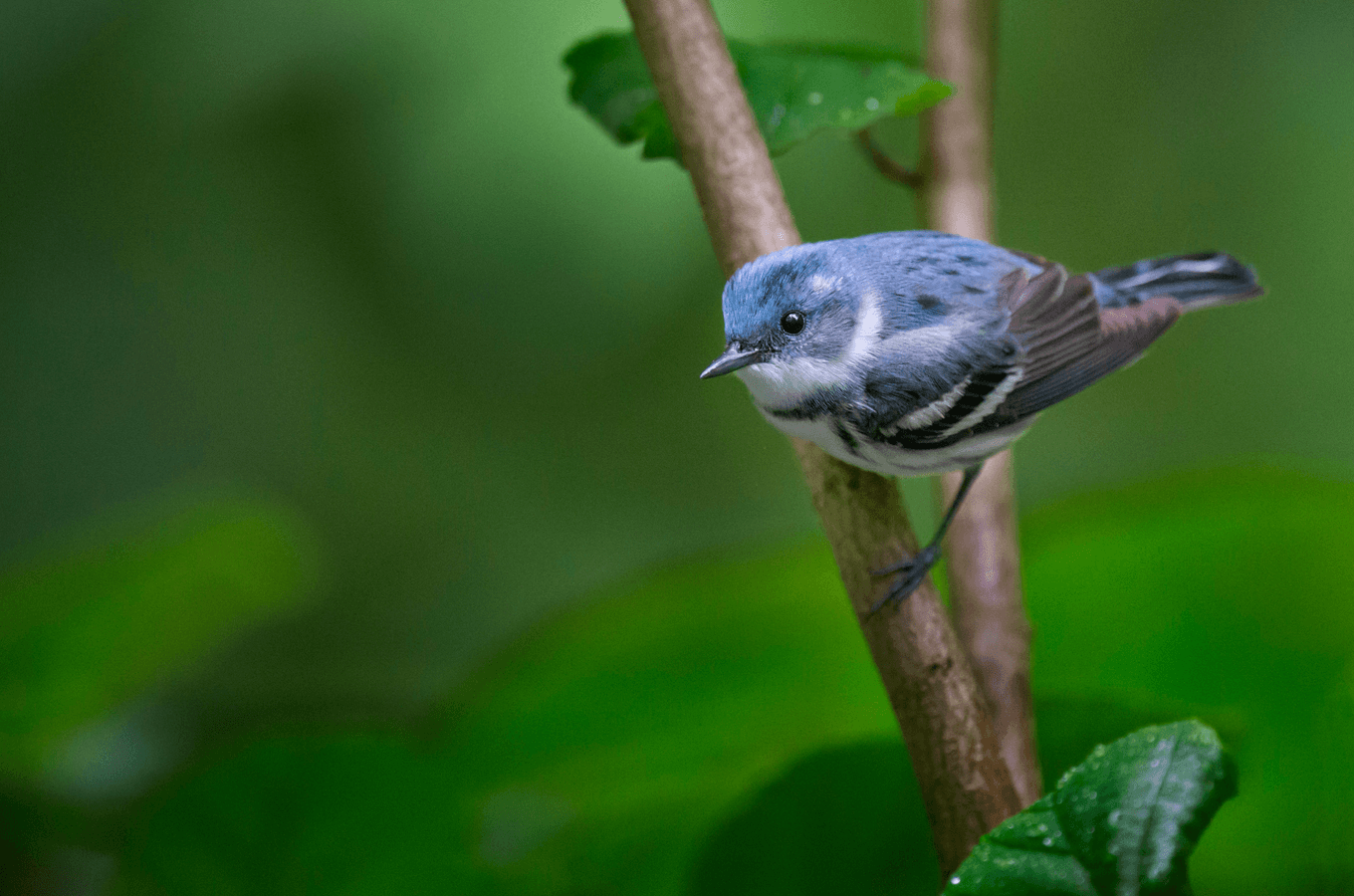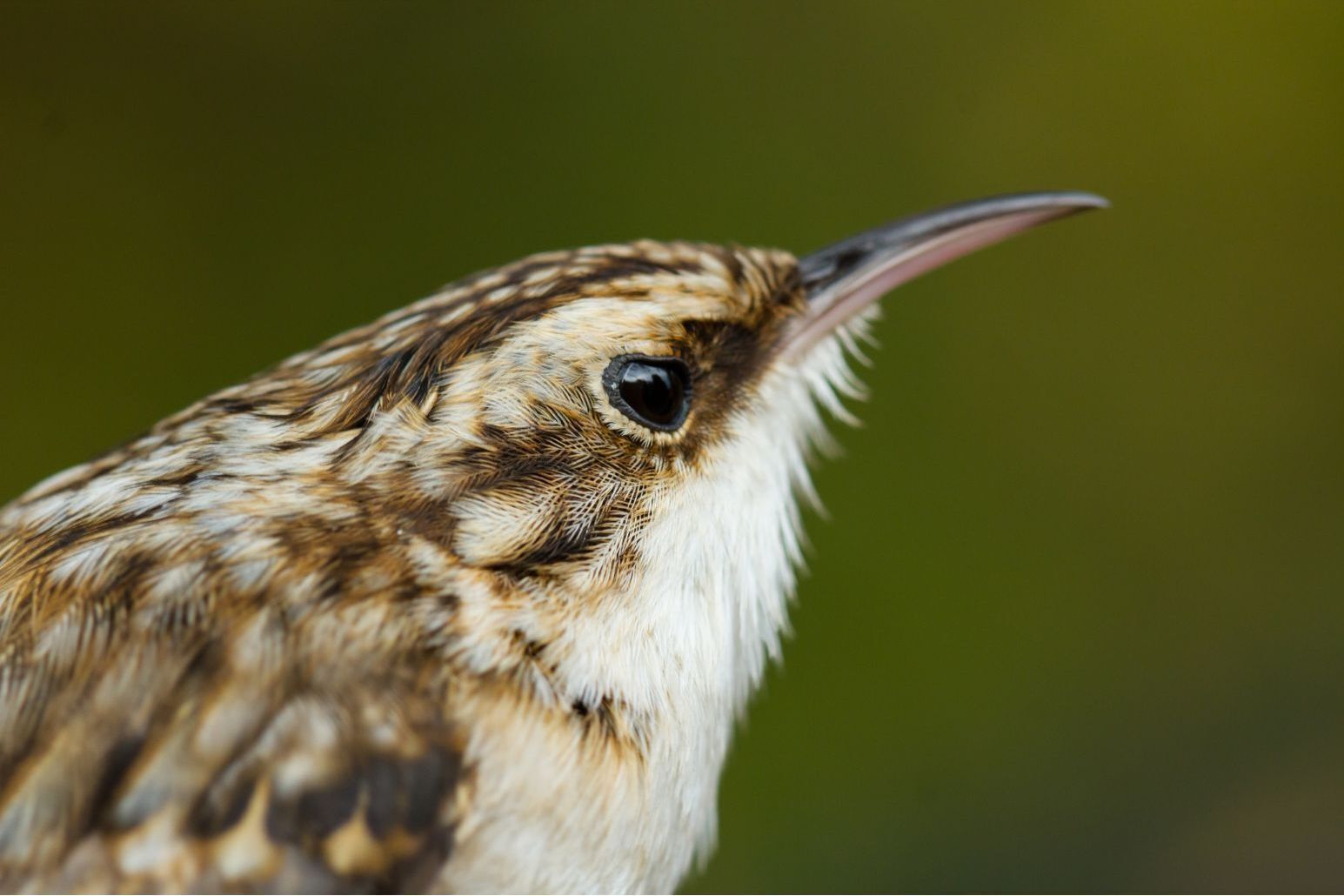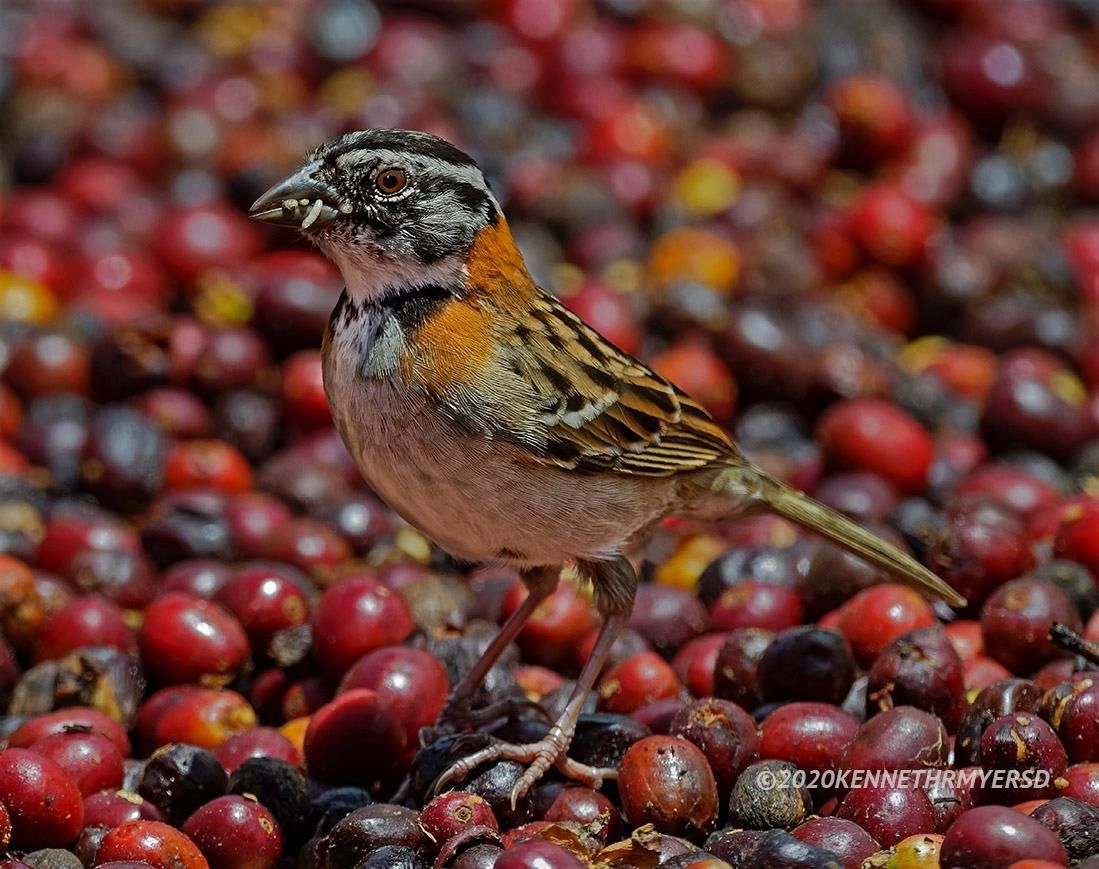Red Crossbill by Alex Patterson
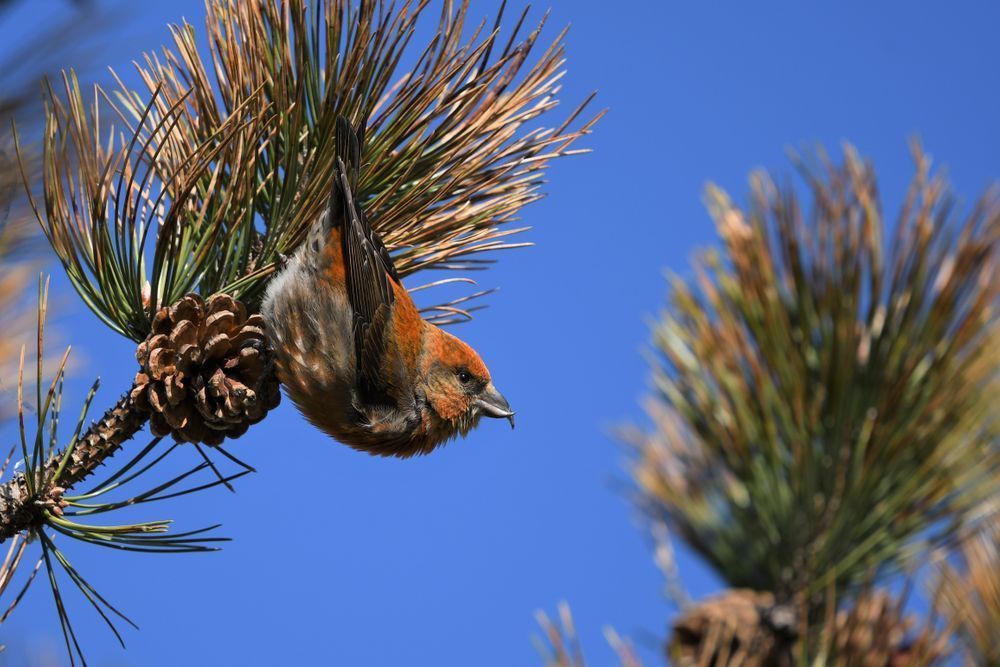
< Return to the Audubon Bird Research Webpage
Blog: Avian Research at Audubon
Get the latest updates on the status of Rhode Island's birds from the Bird Research blog.
Well over 1 MILLION birds passed over Rhode Island on the evening of September 10-11, 2024. The following morning, Audubon Director of Avian Research Dr. Charles Clarkson hit the streets in Downtown Providence to see how these birds fared.
In September, Audubon began constructing and installing three Chimney Swift nesting towers in an effort to support the nesting needs of these birds and to begin identifying the limiting factors the species experiences in Rhode Island.
A bird’s food may be small but it plays a clear and critical role in species survival, not to mention habitat conservation and ecosystem balance, both important for wildlife and humans alike. This effort to create a “Bird Food Baseline” is part of the overall RI Audubon Avian Research Initiative.
Birds' lives are tough and their work is nonstop. The very least we can do to ensure their success is to make their jobs as easy as possible…by protecting habitats and resources critical to their needs.
Each year in the United States, as many as 1 billion birds die from flying into windows. Help us understand which birds are dying & and where: monitor & report window strike deaths to the Audubon Society of RI this spring.
On Sunday, February 4, Audubon hosted its second annual “Birds Across New England” regional conservation symposium. Read the event recap by Dr. Charles Clarkson, Director of the Audubon Avian Research Initiative and access the event recordings.
It's here! This comprehensive, but relatively easy-to-read publication, with its charts, maps and photos, is a wealth of information about breeding bird populations in the Ocean State. In the latest Newport this Week Nature in the Neighborhood installment, Audubon's Lauren Parmelee talks about the data collection process and summarizes some of the findings.
Upon hearing the acronym NASA, images of space stations, rockets, satellites, and incredibly powerful telescopes often come to mind. Generally speaking, most people would not associate the National Aeronautics and Space Administration with bird conservation. But, when you think about the stunning images of our planet that come from satellites orbiting overhead, the potential for earthbound-based datasets to be supplemented by information being collected by the world’s premier space agency is greater than you may think.
October is coming, and so are the sparrows! Yes, we have some resident sparrows throughout the year in Rhode Island, but autumn is the time we see an influx of those hard-to-discern little brown birds. People often overlook this low bush, grass dweller. Some say they all look alike. However, with a little time and patience, you may just fall in love with these feathered friends.
In the spring of 2023, the Audubon Society of Rhode Island joined over 1,800 conservation collaborators with the establishment of its first MOTUS tower. The tower itself will collect data on birds, bats and insects that have been fitted with coded tags as they pass overhead during periods of movement!
Armed with the knowledge from our recent baseline data gathering, Audubon will begin a monitoring and management scheme to reverse the declining trends in our birds. We will join forces with other entities in the state and region to increase our impact.
With the alarming rate of avian decline, we all need to do more, talk more, and engage more in our communities to support bird conservation. Each of us should focus on conservation efforts that we can do in our daily lives, which will have lasting impacts on our bird communities.
Several years of data analysis have pinpointed western Rhode Island as a hotspot for migratory stopovers. Although this may be the best time of year for us to break out our binoculars and hit the trails, the reality is that migration is an extremely perilous and strenuous time for birds. How can we help migratory birds succeed as they pass through our state?
In this Issue: The Release of “The State of Our Birds, Part 2”; Responsibility Bird Monitoring; Neonicotinoid Analysis, MOTUS Tower Installation Click here to subscribe to the Audubon bird research email newsletter!
The Audubon “State of Our Birds Report Part II” begins to pull together the information needed to better understand when birds move across Audubon wildlife refuges, what they need to fuel their journeys, and how Audubon can best manage protected properties to bring their populations back.
From the start, the decline in the bird population (revealed from multiple international studies) was a given. From there, the Audubon initiative was launched as a fact-finding mission, to go in and find out more about how the Audubon Society of Rhode Island could help species in decline.
Walking through the quiet winter woods of Fisherville Brook Wildlife Refuge, I hear several high pitch song notes. I stop to listen and watch. Here! It is as if the tree bark came alive. A tiny bird, feathered in browns, grays, and white, starts to creep, spiraling up a tree. The Brown Creeper. This spectacular small songbird lives in Rhode Island all year but rarely gets noticed due to its amazing camouflage ability and high-pitch call notes that are out of range for some.
Audubon unveils its first comprehensive report offering a full accounting of the current status and conservation actions for birds breeding and overwintering on Audubon Wildlife Refuges.
In this Issue: Data analysis updates and The Audubon Regional Conservation Symposium. Click here to subscribe to the Audubon bird research email newsletter!
A little over a year ago, Audubon created our Avian Research Initiative. Data collection is nearly complete and the late fall and winter will be spent analyzing and writing, with the goal of releasing the first “State of Our Birds” report at the beginning of 2023.
Do you have extra field guides on your shelves? Audubon Society of Rhode Island, Ocean State Bird Club, and Wild Birds Unlimited are partnering again – this time to collect gently used field guides for underserved youth in Rhode Island! Find a drop-off location.
Analysis of Acoustic Recording Unit data has commenced. A great deal of information is now available on our migrating and breeding birds.
In this Issue: Research updates and a synopsis of the 2022 State of the Birds Report. Click here to subscribe to the Audubon bird research email newsletter!
Did you know that wildlife populations across the globe have declined by 68% since 1970? This simple solution can turn the tide in the battle to protect the dwindling bird population to create a safer ecosystem for all living creatures.
Over the course of September and October, fall migration surveys will take place across Audubon’s 14 publicly accessible refuges and we invite experienced birders to participate in data collection as well. With proper training and protocol, you can contribute meaningful data that will be helpful in the creation of our baseline dataset.
In this Issue: Research updates and a recap of the American Ornithological Society Conference. Click here to subscribe to the Audubon bird research email newsletter!
Audubon has been monitoring the situation regarding Highly Pathogenic Avian Influenza (HPAI). Recently, a number of dead shore- and seabirds have been found along the Rhode Island coast - testing has not yet confirmed the presence of HPAI in these birds. Join us on Wednesday, July 13th at 6 pm for a Town Hall with Dr. Charles Clarkson where he will provide an overview of HPAI, the impacts to date on bird populations, and the outlook for the fall migratory season. A Q&A period will follow the presentation. Click to read more.
In this Issue: A Reminder of Why We Do What We Do; Research Updates; Next Chapters; Citizen Science projects. Click here to subscribe to the Audubon bird research email newsletter!
With growing evidence that neonicotinoid insecticides impact so much more than their intended targets, it is incumbent on us to spend time and energy scrutinizing their use in our state.
The job of being a bird is arguably harder now than at any point in their long evolution and each and every one of us has the power to make a difference in the lives of birds - every day.
UPDATE: Nocturnal surveys wrapped up on April 20 across our 14 publicly accessible refuges. Data are still coming in, but to date a total of 25 owls, 1 nightjar (Common Nighthawk) and 1 American Woodcock were detected. Beginning in late-May we will begin surveying our properties for breeding birds.
In this Issue: Two new research initiatives coming to Audubon; and Nocturnal bird Surveys begin April 12. Click here to subscribe to the Audubon bird research email newsletter!
In this Issue: Avian Influenza update; upcoming nocturnal bird surveys; general program updates.
Click here to subscribe to the Audubon bird research email newsletter!
Winter surveys are coming to an end, but more work is ahead!
In this Issue: Conservation in Action (a thank you to volunteers); Updates on phase two of our winter bird surveys at Audubon wildlife refuges; and some preliminary data on phase one of the winter surveys.
Click here to subscribe to the Audubon bird research email newsletter!
In this Issue: An update on the nonbreeding season data collection and coming this spring: nocturnal and breeding season surveys.
Click here to subscribe to the Audubon bird research email newsletter!
On 1 January 2022, Audubon began collecting data across its refuge system on the wintering distribution of birds. As we approach the end of the first two weeks of field surveys, data are already rolling in from across our refuge complex.
In this Issue: Responsibility birds; a call for winter bird survey volunteers; and Citizen Science: The Era of Big Data. Click here to subscribe to the Audubon bird research email newsletter!
Big conservation needs require big data sets.
Audubon begins a new chapter in avian research and conservation. | Cover story by Todd McLeish for the Fall 2021 Audubon Report Issue
Finding the relationship between birds and habitats is the first step in effective conservation.
In this Issue: Introductions to Audubon's Avian Research initiative and the Bird research blog; update on baseline data collections; and more! Click here to subscribe to the Audubon bird research email newsletter!
The Providence Journal published a story about the completion of the state's second bird atlas and the use of the atlas data by Audubon as part of its new scientific research initiative. The story highlights what we know about some of the species in decline and others that are colonizing our state.
Bird Research is underway at Audubon and the first talk on topics related to the conservation of our bird populations will be given on November 21, 2021 from 1 - 2:30pm at the Audubon Nature Center and Aquarium located in Bristol.
With our new Bird Research Initiative, the Audubon Society of Rhode Island aims to ensure that our 9,500 acres provide birds with the resources they require to thrive in the face of habitat loss, climate change and a suite of other factors that are contributing to their decline.
Middletown resident Dr. Charles Clarkson has been appointed Director of Avian Research for the Audubon Society of Rhode Island. In this new position, he will lead efforts in developing research programs to protect birds, other wildlife, and their habitats on Audubon protected properties and other natural spaces in Rhode Island.

